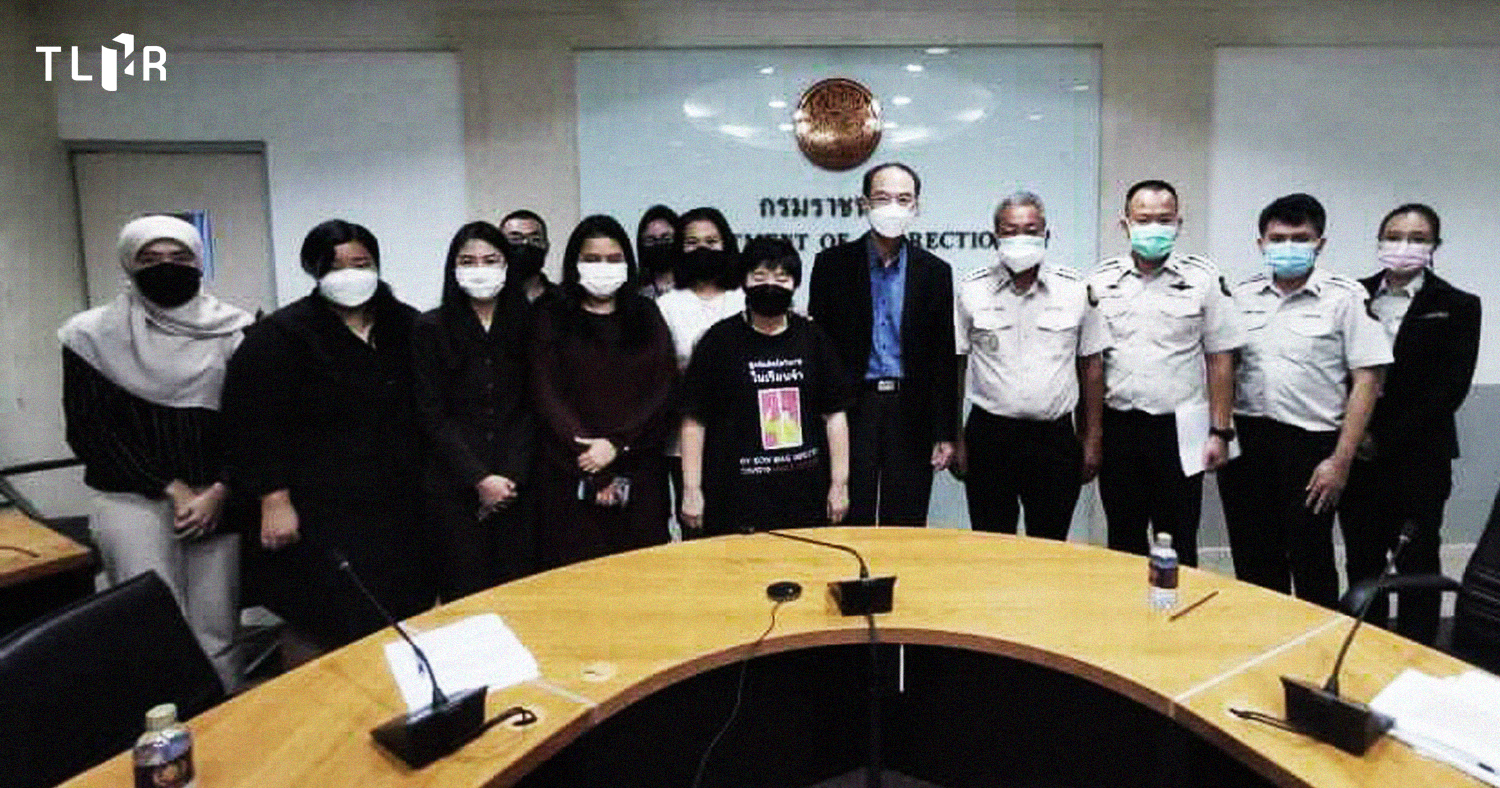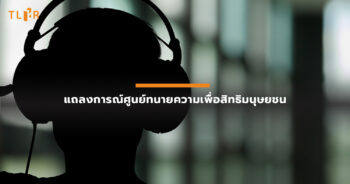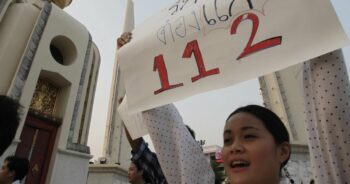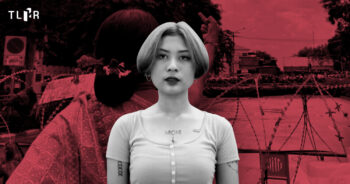On 28 October 2021, human rights organizations together with family members and former political prisoners met with the deputy director of the Department of Corrections to discuss the policy guideline regarding prisoner visitation for family members, trusted persons, and lawyers during Covid-19.
The meeting was joined by representatives from the Cross Cultural Foundation, Amnesty International Thailand, Human Rights Lawyers Association, Thai Lawyers for Human Rights as well as Sureerat Chiwarak (Parit Chiwarak’s mother), and Piyarat ‘Toto’ Chongthep from the We Volunteer.
Prisoners under supervision of the Department of Corrections experienced issues with prisoner visitation throughout August to October under the Covid-19 pandemic.
At the event, Thai Lawyers for Human Rights (TLHR) submitted a letter stating: During the political situation at the end of 2020, a large number of people joined protests and exercised the freedom of expression and assembly, which led to mass accusation. Some of them were denied bail. In the most recent wave during August – October 2021, the Thai Lawyers for Human Rights have been providing legal aid to more than 32 individuals, 24 of which are still currently under care of the Department of Corrections.
The Thai Lawyers for Human Rights, a non-governmental organization working to provide legal aid in cases where people are accused for exercising their freedom of expression, has met with clients at the Rangsit Temporary Prison, Thanyaburi District Prison, Women’s Correctional Institution for Drug-Addicts, Medical Correctional Institution, Central Correctional Institution for Drug-Addicts, and Bangkok Remand Prison, and has identified general problems with the visitation procedure during August – October 2021. Thus, it intended to present these with aims to find common solutions.
The Thai Lawyers for Human Rights have attached a document containing details as follows:
1. Issues related to visits and support by family members
Due to the Covid-19 situation, family members are unable to visit and communicate with prisoners in a timely manner. Online visitation was offered as the only option, which had certain limitations including:
- Limited visitation time. The Women’s Correctional Institution allotted only 10 minutes per visit and one visit a month. That is, a total of 10 minutes per month only.
- Making an appointment with limited quota slots. Family members who could not make an online appointment would miss the chance to visit the prisoner in the given month. Even so, there was no certainty whether it would be possible to make a visitation appointment in the following month either.
- Some family members are seniors and do not have access to technology. As the online means was offered as the only channel, this group of family members and prisoners has no way to communicate with each other at all.
- The quarantine time in the prison was as long as 14 – 21 days. Prisoners were not allowed to leave the quarantine room to have an online meeting with their family members. If the prisoner has not yet appointed a lawyer, the chance to meet with family members during this period to discuss the case or contact a lawyer was impossible affecting his/her right to justice.
- Online ordering system. It was found that the online ordering system for necessary items did not meet the needs and was inadequate due to daily limits. The items provided by the prison through the online system were basic things that allowed a person to live with dignity.
- Lack of support in case of Covid-19 infection. If prisoners contracted Covid-19 and was relocated to the Medical Correctional Institution, they would not be able to contact family members to inform them or use the money in the account to order items or food. Food was provided by the prison only. As a result, the quality of life of the infected prisoners might be inferior to those in ordinary prisons due to the lack of the said support and contact.
- Deposit system in case of prison relocation. It was found that the money in the account of some prisoners was not relocated with them, which created difficulties to use it.
2. Issues related to meeting with lawyers
- Lawyers were refused by the authorities to meet with the prisoners multiple times on grounds of Covid-19 in August. In some cases, the prison informed the court that it was unable to bring the prisoners to the court due to quarantine. Such incidence inevitably affected the prisoner’s right to justice.
- Lawyers may meet the prisoners without the copy of lawyer appointment form. Chapter 2 Item 12 and 14 of the Rules of the Department of Corrections on the Visitation of Prisoners by External Persons and Visit or Contact Related to Prison’s Affairs B.E. 2561 (2018) gives licensed lawyers a legal right to meet with a prisoner during the investigation process. However, prisons have rejected meeting requests without a lawyer appointment form. In some prisons, such as the Bangkok Remand Prison, the process to submit the lawyer appointment form to be signed by the prisoner took longer than one day. As such, it was necessary to submit the document one day in advance and pick it up on the following day, meaning it took more than two days in order to meet with the prisoner.
- Privacy. The Thai Lawyers for Human Rights found that the prison’s visitation system lacked an adequate level privacy. In several cases, officers were standing listening or even intervened in the conversation with the lawyer. Furthermore, the Thai Lawyers for Human Rights found that the Department of Corrections had given information about listening to the conversation between the lawyer and prisoner to the press, even though Section 61 of the Correction Act B.E. 2560 (2017) indicates that “The prison shall arrange a place for prisoners to personally meet and consult with lawyers or persons to be appointed as lawyers as specified in the rules of the Department of Corrections.”
- Examination of documents between lawyer and client. The Thai Lawyers for Human Rights found that not only did correctional officers listen to the conversation, they also examined the lawyers’ memos. Moreover, officers rejected lawyer appointment documents that did not specify the lawyer’s name (but did specify the name of the lawyer who submitted the document for signing), even though Section 29 of the Corrections Act B.E. 2560 (2017) does not give power to correctional officers to control the correspondents between the lawyer and prisoner whatsoever.
- Furthermore, the Thai Lawyers for Human Rights has identified a problem related to the prison’s inadequate online communication system and equipment. This has led the officers to limit the duration of the talk between the lawyer and prisoner, which contradicted to the accused person or the defendant’s right to due process. Such limitation unavoidably affected both the lawyer’s work to prepare and defend the case, as well as the prisoner’s freedom in the long run.
Thai Lawyes for Human Rights’ Recommendations for the Department of Corrections
- The Department of Corrections should promptly arrange a visitation system for family members and prisoners in the manner that is safe during the Covid-19. In case online visitation remains necessary, it should increase the duration and frequency to allow prisoners to communicate with the outside world and the loved ones as part of the basic human rights.
- The Department of Corrections should ensure that lawyers are able to meet with prisoners without any obstacles and with adequate equipment and privacy according to the rights guaranteed in the Criminal Procedure Code and the Corrections Act B.E. 2560 (2017).
Deputy director of the Department of Corrections expects the visitation measures to be eased within one month, after all prisoners have received the first Covid-19 shot.
After hearing the presentation of the overview of the problems by family members, former prisoners, and human rights organizations, Tawatchai Chaiwat, deputy director of the Department of Corrections, clarified that despite having to take care of more than 300,000 prisoners nationwide, which ranked the 6th highest in the world, 3rd in Asia, and 1st in ASEAN, under limited resources and budget, the Department of Corrections managed to perform well amidst the Covid-19 pandemic. The number of deaths was just over 100 cases, most of which were the elderly or those with chronic diseases.
He said that the visitation measure is expected to ease up within 4 weeks after all prisoners have received the first dose of Covid-19 vaccine or developed immunity. At the current time, 78% of the prisoners have been inoculated and others have been infected with Covid-19 and developed immunity. As for the measure requiring lawyers to attach a copy of lawyer appointment form to the visitation request, it was put in place out of the possibility that the lawyers might discuss other matters unrelated to the case causing problems.




